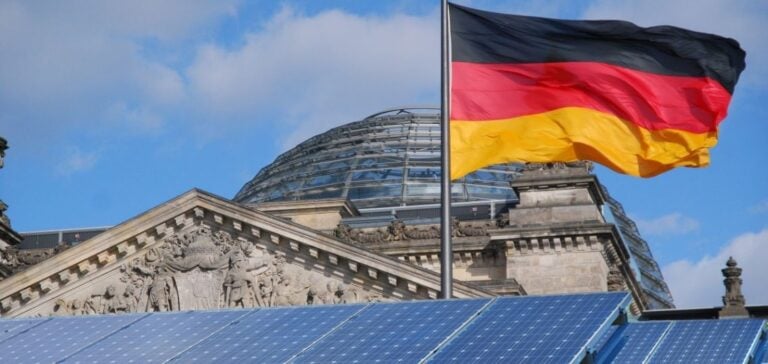Donald Trump’s recent statements on German energy policy during the US presidential debate prompted an immediate reaction from Berlin.
The former US president claimed that Germany had “failed” in its energy transition and had been forced to return to traditional energy sources such as coal.
This misinterpretation was quickly corrected by the German Foreign Office, which used Platform X to set the record straight.
Since the launch of its “Energiewende” program in the early 2000s, Germany has gradually reduced its dependence on fossil fuels, increasing the share of renewable energies in its energy mix.
Today, over 61.5% of the electricity produced in Germany comes from renewable sources such as wind, solar and hydroelectric power.
This share has risen considerably since the previous year, when it stood at 53.3%.
By contrast, the share of coal, which still accounted for 34% of the energy mix in 2022, fell to 20% in the first half of 2024, showing a steady decline.
Clarifications from Berlin and the State of Energy Transition
In response to Trump’s comments, the German Foreign Ministry stressed that Germany has not built any new coal or nuclear power plants, but continues to close them in line with its energy transition commitments.
Closing nuclear power plants and phasing out coal are key elements of Germany’s energy policy, aimed at achieving carbon neutrality by 2045.
The country plans to completely eliminate the use of coal by 2038, a timetable that remains unchanged despite the challenges.
Trump also criticized Democratic candidate Kamala Harris, accusing her of wanting to ban hydraulic fracturing, a point of contention in the US.
However, the debate on fracking and fossil fuels in Europe takes on another dimension, where the transition to renewable energies is often seen as a lever for reducing energy dependence on external imports, particularly from Russia.
Misrepresentation and Diplomatic Consequences
Trump’s comments on German energy supply reflect a lack of understanding of European dynamics and the energy diversification strategy implemented by Germany and the European Union.
As the European Union’s largest economy, Germany plays a central role in defining European energy policies.
Berlin’s response is therefore also aimed at protecting this influence and preventing the spread of inaccurate information that could weaken its position on the international stage.
The exchange between Trump and Berlin takes place against a backdrop of historically tense relations between the two countries on trade and defense issues.
Between 2017 and 2021, Trump regularly criticized Germany, notably over German trade surpluses and the country’s participation in NATO.
These new statements are part of a continuing communications strategy focused on provocation and economic nationalism.
Energy Perspectives and Future Challenges
The German energy transition model, although often criticized for its cost and complexity, serves as a benchmark for other European countries seeking to reduce their dependence on fossil fuels.
Diversifying energy sources and increasing the share of renewables are strategies considered not only for environmental reasons, but also to guarantee energy security in an unstable geopolitical context.
Germany’s approach of closing coal- and nuclear-powered plants while investing massively in renewable energies offers a marked contrast to US energy policies, where fossil fuels remain an important part of the energy mix.
This divergence reflects different strategic priorities: while the US seeks to exploit its vast oil and gas reserves to ensure its energy independence, Germany prioritizes the reduction of CO₂ emissions and innovation in renewable technologies.
The debate around renewables, gas and coal remains at the heart of political and economic discussions on both sides of the Atlantic.
The US elections and their implications for energy policies could affect transatlantic relations and influence the energy strategies of European countries.
In Germany, continued progress towards decarbonization targets leaves no room for backtracking, despite external criticism.





















